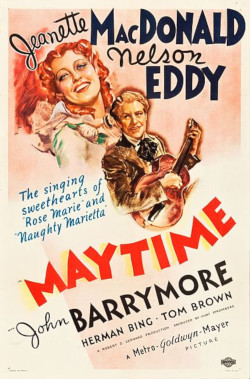Dorris Braithwaite (DB-95-038)

MGM, Public domain, via Wikimedia Commons
Early in 1995, Dorris (Doris) Braithwaite of Bolton, Greater Manchester responded to a request for 1930s cinemagoers to get in touch with Cinema Culture in 1930s Britain, and joined the twenty-two individuals living in the Greater Manchester area who were interviewed for the project as core informants later that year. Mrs Braithwaite was born in Stockport in 1922: her father was an engineer, her mother a housewife. On leaving school at fourteen, she worked as a shop assistant and in later years as a machinist, a typist and a housewife. A published author, Mrs Braithwaite was a member of Bolton's Clarence Street Creative Writers Group and had written articles and a book about the singing star Nelson Eddy. She was interviewed along with her friends and fellow writers, Vee (Vera) Entwistle and Kath (Kathleen) Browne on 11 May 1995, and with Vee Entwistle on 5 June 1995.
In the first interview, which took place in Bolton Library, the three share their earliest cinemagoing memories, which involve some unforgettably frightening films; and recollect the cinemas they attended as they were growing up--how often they went and how they decided on which films to see. Mrs Braithwaite takes the interviewer through her extensive collection of correspondence with Nelson Eddy, Alice Faye, and other stars, and the conversation takes in other favourites, including Astaire and Rogers ("I felt I could get up and dance," says Kath Browne). There follows general discussion of the plots of some Nelson Eddy and Jeanette MacDonald films, and memories of sending off to film magazines for photos of stars. The topic of British films is raised: there is some talk of Lancastrian film personalities, and Mrs Braithwaite records her experience of being an extra in the 1934 Gracie Fields vehicle Sing As We Go! Praise for British World War II films segues to a discussion of the VE Day commemorations that were in train at the time of the interview--which ends on an amusing note, with anecdotes about Nelson Eddy buying a horse and the interviewees' jealousy of Eddy's wife. The second interview was recorded during a day-long visit to Mrs Braithwaite's house, which included a viewing and discussion of the Eddy/MacDonald film Maytime and a presentation of Mrs Braithwaite's collection of film memorabilia, several items of which she donated to the project. Comparisons are drawn between Nelson Eddy and other male stars of his day, and more than sixty film personalities, both male and female, are named along with their films. There is discussion of US radio programmes featuring Eddy and other stars, of Mrs Braithwaite's writings, of her membership of the Nelson Eddy Appreciation Society and contacts with other Eddy fans in the UK and overseas, and of her extensive correspondence with her other favourite, Alice Faye. The interviewees offer detailed recollections of dreams about their idols, and of acting out love scenes from films with friends. Towards the end of the interview, discussion returns to Nelson Eddy's life, with anecdotes and gossip about his working relationships with co-stars, his acting skills, and his singing voice and repertoire.Interview transcript | Listing of cinemas, films and stars mentioned
Audio-synced interview (2 of 2)
Interview transcript | Listing of cinemas, films and stars mentioned
Documents, Memorabilia and Related Links
Bolton home pageScan of CCINTB Questionnaire (DB-95-038CQ001)
Scan of letter (DB-95-038PL001) | Transcript
Scan of letter (DB-95-038PL003) | Transcript
Scan of letter (DB-95-038PL006) | Transcript
Scan of letter (DB-95-038PL008) | Transcript
Scan of letter (DB-95-038PL009) | Transcript
Alice Faye singing 'Now it Can be Told' (YouTube)
Extract from 'Sing as We Go' with Gracie Fields, 1934 (BBC site)
Bolton News article on Dorris Braithwaite, 1995 (DB-95-038AR001)
Bolton News article on Dorris Braithwaite, 1997 (theboltonnews site)
Book chapter drawing on Mrs Braithwaite's interviews:
Kuhn, A. (2002). An Everyday Magic: Cinema and Cultural Memory. London: I.B. Tauris, Chapter 8.